1. Get a smart meter
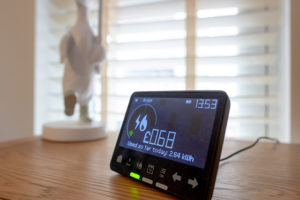 Smart meters help to track your energy usage in real time – and many energy providers will supply their customers with one for free.
Smart meters help to track your energy usage in real time – and many energy providers will supply their customers with one for free.
Installing a smart meter can help to inform your decisions around energy usage and which appliances are thirstier than others.
For those that have a smart meter, there are free apps such as Utrack by Uswitch which allow you to keep track of your energy usage if you are away from home. Other apps and comparison tools are available.
2. If it's not in use, switch it off
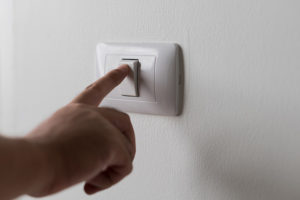 Turning appliances off at the socket could save you up to £70 a year.
Turning appliances off at the socket could save you up to £70 a year.
Switch off any lights when a room is not in use. Electrical appliances which are on standby still use electricity, so switching these appliances off where possible will result in a small annual saving on your energy bills.
3. Only use wired electrical devices when you need to
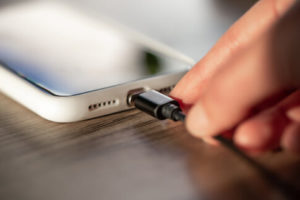 Wired devices such as phone chargers and printers should only be used when they’re needed.
Wired devices such as phone chargers and printers should only be used when they’re needed.
Leaving a phone on charge overnight still uses electricity even after it reaches 100%, which could result in energy wastage as your phone is receiving power while already charged. Manufacturers suggest keeping your phone battery topped up throughout the day between 20% and 80%.
With devices such as printers, consider whether using them is really necessary.
4. Choose a shower over a bath
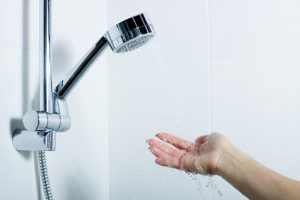 Showers use around half of the water of baths on average. Typical shower heads also pump out around six to nine litres of water per minute, so cutting down your shower time can help to further save both water and energy.
Showers use around half of the water of baths on average. Typical shower heads also pump out around six to nine litres of water per minute, so cutting down your shower time can help to further save both water and energy.
It’s worth checking if your water supplier can offer free energy-efficient shower heads – Bristol Water supplies public mains water to the Somerset area and offers water saving packs free of charge.
Find out if you’re eligible for one by visiting Bristol Water.
5. Get the most out of your washing machine
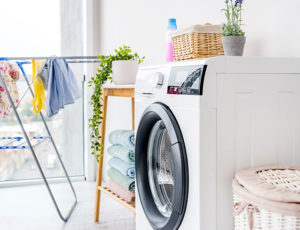 Washing clothes at a lower temperature could save you up to £40 a year.
Washing clothes at a lower temperature could save you up to £40 a year.
Washing clothes at 30°C rather than 40°C can cut electrical demand by up to 40%. Modern clothing detergents are designed to clean effectively at lower temperatures, meaning using a lower temperature for general washes will clean your clothes just as well as a hotter wash.
Modern washing machines now often have Eco settings, which allow you to use less water and energy when doing your laundry. Coupled with only using the washing machine when it’s full or nearly full will allow you to maximise each use while minimising electricity and water usage.
6. Think about how you dry your clothes
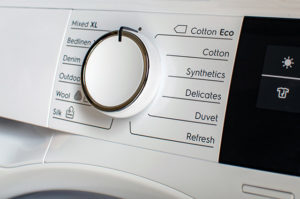 Using your tumble dryer less could save you £70 a year.
Using your tumble dryer less could save you £70 a year.
Use your tumble dryer less frequently where possible, using a washing line instead when the weather is appropriate.
If your tumble dryer is in need of replacement, consider a heat pump model over a standard condensing dryer. Heat pump models need only 50% of the power of a standard dryer to operate.
7. Don’t overfill your kettle
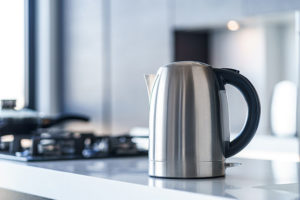 A kettle uses about 6% of all the electricity supplied to the home. The more water that’s in a kettle, the longer it takes to boil and the more energy that’s consumed. If replacing your kettle, look for a lower wattage model with a smaller volume to help eliminate waste and reduce energy consumption. Around 1200w and under two litres is best.
A kettle uses about 6% of all the electricity supplied to the home. The more water that’s in a kettle, the longer it takes to boil and the more energy that’s consumed. If replacing your kettle, look for a lower wattage model with a smaller volume to help eliminate waste and reduce energy consumption. Around 1200w and under two litres is best.
It’s also worth considering using a thermal flask to hold unused boiled water. Some of these containers can keep your hot water ready for use for over an hour after boiling.
8. Look after your fridge freezer
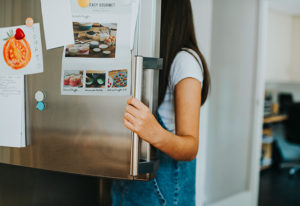 There are several ways you can ensure your fridge and freezer is being used efficiently:
There are several ways you can ensure your fridge and freezer is being used efficiently:
- Avoid opening and closing your fridge and freezer too much and don’t leave the fridge door open unnecessarily. Aside from the lights switching on each time the fridge is opened, fridges also need to cool down again, using more energy in the process.
- Defrost your fridge and freezer regularly. If your freezer frosts up quickly, check that the door seal is working properly.
- A moving flow of air around the rear pipes of fridges and freezer helps to save electricity. We recommend a gap of around 5cm between surfaces to the sides, rear and top of the unit.
- Try not to over-fill your fridge and freezer. If there’s some empty space in a fridge or freezer, cold air can circulate around the contents and help to cool the rest of the interior space.
9. Check your windows for proper ventilation
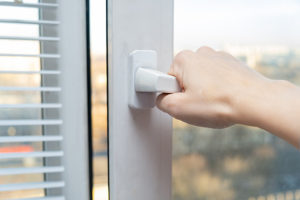 Avoid using windows as a temperature control when heating your home. When windows and doors are closed, take care to make sure there’s still adequate ventilation – such as trickle vents in windows – to prevent the unwanted build-up of moisture and mould.
Avoid using windows as a temperature control when heating your home. When windows and doors are closed, take care to make sure there’s still adequate ventilation – such as trickle vents in windows – to prevent the unwanted build-up of moisture and mould.
It’s best to heat the home as a whole rather than just the spaces you use. Increasing your home’s ability to absorb, store and release heat through insulation and higher efficiency windows and doors is much more effective than using single windows to control the temperature of a home.
You can learn more about how to do this by visiting our 10 bigger changes page.
10. Turn down your thermostat slightly
 Turning your thermostat down by just 1°C can cut bills by up to 10%, making a significant saving without a noticeable difference to the temperature of your home.
Turning your thermostat down by just 1°C can cut bills by up to 10%, making a significant saving without a noticeable difference to the temperature of your home.
Balancing your radiators’ thermostatic valves helps to form a balanced heat across your property, avoiding overly hot rooms. This also helps your home to warm faster and more evenly, especially where doors are left open, and heat can move freely internally.
11. Time your heating
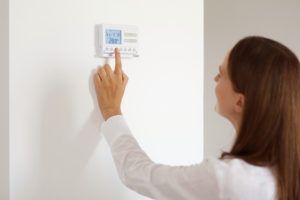 Set a timer for your heating so it’s not on when your house is empty.
Set a timer for your heating so it’s not on when your house is empty.
If away for extended periods of time, turn down your thermostat to ensure your pipes don’t freeze while not wasting energy or money to heat an empty home.
12. Keep an eye on your radiators
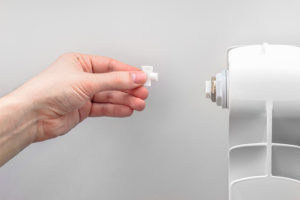 If you’re able to, bleeding your radiators helps to ensure they are giving out as much heat as possible. If you can hear bubbling in your radiators, this is because there is air in the radiator system, limiting the volume of circulating hot water.
If you’re able to, bleeding your radiators helps to ensure they are giving out as much heat as possible. If you can hear bubbling in your radiators, this is because there is air in the radiator system, limiting the volume of circulating hot water.
Bleed the radiator in good time before winter and ensure that the system is off before doing so. Choose the panel that’s at the top of your property. Make sure to catch the water and avoid over-tightening the radiator valve as it can be easily damaged.
Some older radiators may need a flush to remove sludge within the system. You can ask for a flush and cleanse to be added as part of your boiler service.
Turning down radiators in rooms you aren’t using or use less could save you up to £70 a year.
When you’re not using rooms, turn radiator valves down to between 2.5 and 3 (roughly 18°C). Turning off radiators completely is less energy efficient as your boiler has to work harder to increase the temperature again than if kept at a low setting. Very cold rooms are also more likely to be affected by damp and mould.
Older people, young children and those with pre-existing health conditions are more vulnerable to cold, so make sure you are keeping warm enough and the indoor temperature is at least 18°C.
13. Check the age of your boiler
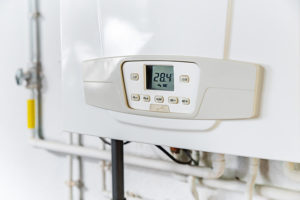 If your boiler is less than 15 years old, it is considered A-rated – making it one of the more efficient boilers on the market.
If your boiler is less than 15 years old, it is considered A-rated – making it one of the more efficient boilers on the market.
It’s worth noting that 99% of gas boilers are running below their A-rated efficiency, so if you have a combi boiler, look at reducing your flow temperature. This involves reducing the circulating heat slightly for the water going into your radiators and back into your boiler, cutting your bills by 6-8%.
Controlling your boiler’s heating temperature dial could save as much as 8% of your gas heating consumption. The heating dial is next to the hot water dial or accessed by digital controls – your boiler handbook will provide more information.
Turning your combi boiler flow temperature down to 60°C could save you up to £100 a year. You can find a simple guide on how to do this online at Nesta’s website.
14. Use your dishwasher
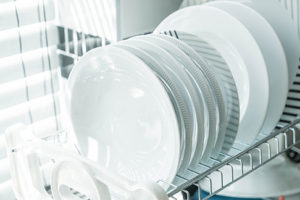 If you own a dishwasher, it’s better to use it rather than hand-washing. The average water consumption of dishwashers is around 13 litres per wash, whereas hand-washing the equivalent of a fully loaded dishwasher can use up to as much as 100 litres.
If you own a dishwasher, it’s better to use it rather than hand-washing. The average water consumption of dishwashers is around 13 litres per wash, whereas hand-washing the equivalent of a fully loaded dishwasher can use up to as much as 100 litres.
When loading your dishwasher, make sure it’s close to full before switching on for better water and electrical efficiency.
15. Choose paperless billing
 It’s worth checking to see if your energy provider will offer a small discount if you opt for paperless billing given the reduced costs involved.
It’s worth checking to see if your energy provider will offer a small discount if you opt for paperless billing given the reduced costs involved.
